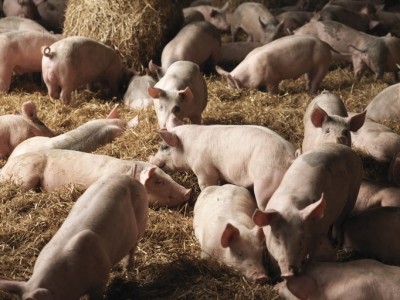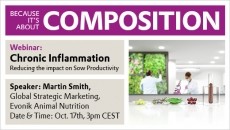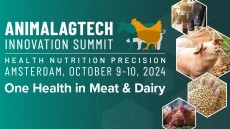Study: Resin acid concentrate could replace zinc oxide in diets of weaned piglets

Various nutritional solutions are being tested to support piglet immune defense during weaning, the most critical and stressful moment of pig production.
Newly released research has zoned in on one particular candidate. The team behind a paper, published in Frontiers in Veterinary Science, said resin acid concentrate (RAC) appears promising because of its anti-inflammatory properties.
Based at Schothorst Feed Research, in the Netherlands, and at Finnish feed company, Hankkija Ltd, the study’s authors outlined how resin acids derived from coniferous trees are phytochemicals have been used since ancient times in Asian and Scandinavian traditional human medicine for treating wounds.
They cited a paper by Aguirre et al that demonstrated how supplementation of resin acids in broiler diets supported mucosal integrity via suppression of intestinal matrix metalloproteinase (MMP) activity, which degrades collagen fibers. “In the same study, in-feed resin acids reduced duodenal inflammatory T-cell abundance.”
Supplementation of RAC in sow diets, they added, showed a beneficial effect on colostrum IgG levels, with the team referencing another paper by Finnish researchers.
Objective
The authors said the aim of their study was to compare the effect of ZnO (2,500 mg/kg diet) and RAC (200 mg/kg diet) on the immune defense of weaned piglets challenged with lipopolysaccharide (LPS).
To test whether feed additives are able to support piglet health, immune system activation and growth, a model that can challenge the immune system is useful, they explained.
They chose a (LPS) challenge model because it is effective in elucidating the integrated pathophysiology of infection and inflammation. “The LPS molecule is present on the outer surface of all gramme-negative bacteria, is widely used as an immune stimulant and has been used to model bacterial infection in experimental farm animals.”
The study
Diets were prepared as mash and were formulated free of antimicrobial growth promoters, said the research team.
The nutrient content of the diets met the requirement according to the NRC recommendation.
"RAC is a feed additive powder with 37.5% resin acids dried onto 62.5% of food grade carrier, produced using a standardised manufacturing procedure by Hankkija Oy (Hyvinkää, Finland). The 200 mg/kg dose of RAC thus provided 75 mg resin acids per kg feed."
They outlined how a basal diet was prepared for the experiment - it was divided into three portions.
"The first portion became diet A and was regarded as the negative control diet (NC). To the second portion (basis for diet B), 2,500 mg ZnO/kg feed was added and it became diet B (i.e., NC + ZnO). To the third portion, 200 mg RAC/kg feed was added, and it became diet C (i.e., NC + RAC)."
Piglets were challenged at day seven and 21 post-weaning, and blood was sampled one hour and 30 minutes and three hours after each challenge to determine serum levels of pro- and anti-inflammatory cytokines.
The findings
The levels of serum tumor necrosis factor alpha (TNF-α) and interleukin 8 (IL-8) increased at day seven and 21, and those of IL-6 at day 21 when challenged piglets were fed a diet supplemented with ZnO.
In challenged piglets fed with RAC, the serum levels of IL-1β, IL-6, IL-8, IL-10 and TNF-α were increased at day seven and 21, except for that of IL-1β, which was not affected at day 21.
The increased levels of these cytokines indicate the successful immune-modulatory effect of both ZnO and RAC, said the authors.
“Based on the serum cytokine profile analysis, the stimulation of anti- and pro-inflammatory cytokines was more pronounced in piglets fed a diet supplemented with 200 mg RAC/kg than in those fed the diet supplemented with 2,500 mg ZnO/kg,” they said.
The results indicate that RAC is a potential candidate to replace ZnO in weaned piglets' diets, concluded the team.
Source: Frontiers in Veterinary Science


















